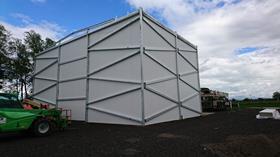
With Brexit still looming large in the British agricultural landscape and sustainability demands growing, fresh produce supply chains seem to face an expanding array of pressures.
But groups like the Dundee-based James Hutton Institute uses its team of 600 scientists to apply scientific progress to the sustainable use of land and to help tackle challenges facing growers.
This institutes’ business development manager, Jamie Smith, told Fresh Produce Journal at the Fruit Logistica conference in Berlin that these new pressures could be mitigated through new varieties and “smarter farming”.
“The shortage of labour is being felt across the EU with migration slowing. Traditional growing methods will have to change, and will have to embrace getting leaner and more efficient,” he said.
“I would be surprised if a lot of the main producers aren’t looking very heavily at robotics, automatic strawberry picking etc. That labour shortage isn’t suddenly going to go away especially with the cloud overhanging Brexit at the moment.
“There’s also the increasing cost of production for growers, the value of land continues to go up, and the input of environmental pesticides and herbicides.
Smith added that an increasingly nutritionally literate consumer base meant growers have to balance yield, efficiency and sustainability.
“Customers demand reduced pesticides and herbicides, so you’re in an environment when you need to get higher yields to make yourself more efficient, but at the same time, the products you use are being withdrawn because customers demand these things.
“Consumers are far more aware now of what they consume, where it’s come from, the provenance of it, and the nutritional benefit of it.
“People are far more aware of these things called polyphenols or antioxidants, or anthocyanins; they want blackcurrents because they are higher than blueberries in anthocyanins. The internet has only increased customer knowledge, not just in the UK but all over the world.
“You almost have to get the perfect variety these days. That’s why events like these are so big, because everyone is trying to find the next new variety.'
Smith added that improving technologies and farming methods would also play key roles going forward.
“It’s not just about new varieties. There are ways that farmers can farm smarter and better. Whether that’s real time data, new growing systems, or vertical farming there’s ways farmers can improve without new varieties, but certainly I believe a lot of the issues we face will be reached with new varieties.”



